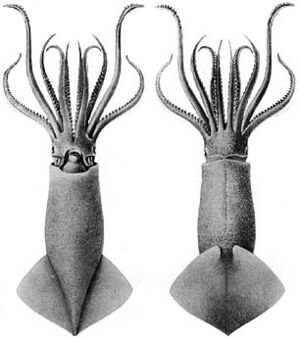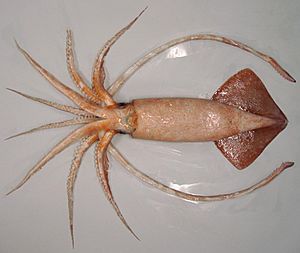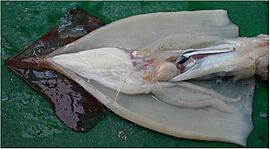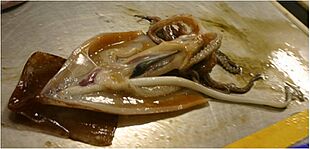Greater hooked squid facts for kids
Quick facts for kids Greater hooked squid |
|
|---|---|
 |
|
| Onykia ingens (about 400 mm ML) | |
| Conservation status | |
| Scientific classification |
|
| Kingdom: | Animalia |
| Phylum: | Mollusca |
| Class: | Cephalopoda |
| Order: | Oegopsida |
| Family: | Onychoteuthidae |
| Genus: | Onykia |
| Species: |
O. ingens
|
| Binomial name | |
| Onykia ingens (Smith, 1881)
|
|
| Script error: The function "autoWithCaption" does not exist. | |
| Synonyms | |
|
|
Script error: No such module "Check for conflicting parameters".
The greater hooked squid (scientific name: Onykia ingens) is a type of squid that lives in the deep, cold waters around the subantarctic oceans worldwide. It belongs to the family Onychoteuthidae, which are known for having hooks on their arms and tentacles.
For a long time, this squid was known by a different scientific name, Moroteuthis ingens. But scientists have recently agreed that its correct scientific name is Onykia ingens.
Contents
How Big Does the Greater Hooked Squid Get?

We don't know the exact size of a fully grown greater hooked squid, including its long tentacles. However, many experts believe its main body, called the mantle, can grow up to 94 centimeters (about 37 inches) long.
When these squids are born, their eggs are tiny, averaging about 2.1 millimeters inside the mother. Young squids, called juveniles, are usually 4.6 millimeters or larger. It's thought that these young squids live closer to the ocean surface.
Once they grow to about 200 millimeters (8 inches) in mantle length, they move to deeper waters. There, they start hunting for bigger prey. Female greater hooked squids grow much faster than males. They also become more than five times larger than male squids when fully grown.
What Does the Greater Hooked Squid Eat?
What the greater hooked squid eats changes a lot as it grows bigger. Younger squids, those smaller than 200 millimeters in mantle length, eat more crustaceans (like crabs and shrimp) and other small squids.
Older, more mature squids eat mostly fish and almost no crustaceans. A common food for all sizes of this squid is myctophid fish, also known as lantern fish. These are small, deep-sea fish.
Sometimes, bigger greater hooked squids will even eat other squids of their own kind. This is called cannibalism, and it can make up a small part of their diet.
Who Eats the Greater Hooked Squid?
Like many large squids, the greater hooked squid has several predators in the ocean. These include big fish like the patagonian toothfish. Many marine mammals also hunt them, such as pilot whales, bottlenose whales, dwarf sperm whales, and the giant sperm whale.
Other animals that prey on this squid include large seabirds like the king penguin and the wandering albatross. Even seals, specifically the Antarctic and Subantarctic fur seals, hunt them. Other types of squid can also be predators.
Images for kids
 | Stephanie Wilson |
 | Charles Bolden |
 | Ronald McNair |
 | Frederick D. Gregory |





